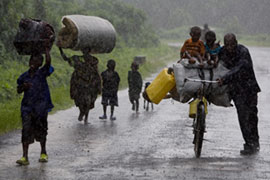Aid sent to DR Congo refugees
UN takes water and health supplies to people displaced from camps around Goma.

“We want to look at the security situation and gradually introduce our programmes,” Sean Raster, a logisitic officials with the British medical charity Merlin, said.
The aid convoy was given the go ahead after government troops and fighters from the National Congress for the Defence of the People (CNDP) promised to allow it safe passage from Goma.
Alain Leroy, the head of UN peacekeeping operations, told Al Jazeera that the world body will “do the maximum” to protect civilians in Goma.
“It’s our mandate to protect the civilians in Goma. We have already started, we are continuing to reinforce our operation in Goma to protect civilians,” he said.
“I cannot say that it’s a 100 per cent guarantee, but in any case, we will do the maximum to protect the civilians of Goma.”
Envoy appointed
Meanwhile, Ban Ki-moon, the UN secretary-general, announced that he was appointing Olusegun Obasanjo, the former president of Nigeria, as his special envoy to help defuse the crisis.
| Your Views |
|
How should the UN respond to the escalating violence in Democratic Republic of Congo? |
Ban also said that he will travel to the region this weekend for talks with Joseph Kabila, the president of the DRC, and Paul Kagame, his Rwandan counterpart.
The UN efforts come as authorities in the provincial capital declared a curfew in Goma.
It is said to come into effect from 11pm (2100 GMT) to 5am (0300 GMT), following a spate of murders, rapes and lootings last week blamed on elements of the government army.
“I confirm the establishment of a curfew throughout the city of Goma to better control the morning and night-time movements of the population,” said Julien Paluku, governor of the eastern North Kivu province.
The region has seen a mass movement of people in recent days as they have tried to find a safe haven from an offensive by the CNDP, led by Laurent Nkunda, a renegade general who says he is fighting to protect the region’s ethnic Tutsis.
According to an CNDP spokesman, the government of the DRC initiated the conflict and has “launched war on its people”, by refusing to negotiate with Nkunda’s forces.
“In rejecting the offer of direct dialogue with the CNDP, as recommended by the parliament, the government has just confirmed its militarist position,” Bertrand Bisimwa said.
But Kinshasa has rejected the accusations.
Many people who fled their villages due to the fighting in North Kivu province found themselves in makeshift camps around Goma, but these then emptied as the government forces crumbled in the face of the CNDP advance.
“Most of these people fled the camps in fear and in panic as they heard that troops were advancing on the area,” Fernandez said. “There was considerable panic in the area.”
Al Jazeera’s Mohammed Adow, reporting from Goma, said that a spokesman for the CNDP said that the rebels did not want to see anyone in the camps.
“He says that is not where the people are supposed to be. He says they should go back home, tend their livestock and cultivate their land, live their normal lives,” Adow said.
“They are also leaving voluntarily because of desperation and lack of food.”
Humanitarian corridors
Nkunda has announced the opening of “humanitarian corridors” through rebel lines, as a ceasefire he declared on Wednesday appeared to be holding.
 |
| The fighting has brought untold miseries to the Congolese [AFP] |
The main road linking Goma and Rutshuru, 75km to the north, was again packed with people on Sunday as some of the displaced people tried to return to their villages.
“We received no food, so we are returning,” Paul Bashoboye Bareke, walking with his wife and their eight children, said.
European and US envoys travelled across the region over the weekend in an attempt to find a diplomatic resolution to the crisis.
David Miliband, the British foreign minister, and his French counterpart Bernard Kouchner met Jakaya Kikwete, the Tanzanian president and chairman of the African Union, on Sunday following talks with Joseph Kabila, the DR Congo president, and Paul Kagame, the Rwandan leader.
Kabila and Kagame have agreed to attend a summit in Nairobi, Kenya, next week to discuss the conflict, which Kinshasa accuses Kigali of supporting by aiding Nkunda’s forces.
Rwanda denies any involvement in the fighting, but the Uruguayan military commander who oversees his country’s deployment in DR Congo has suggested that Nkunda has Rwandan tanks and artillery.